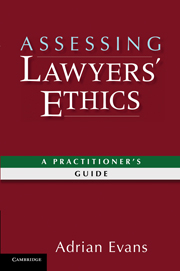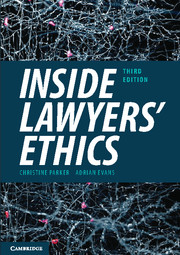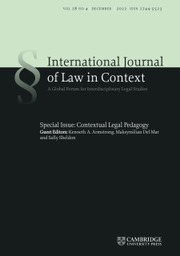Assessing Lawyers' Ethics
Legal practitioners operate in an environment of seemingly endless ethical challenges, and against a backdrop of diminishing public opinion about their morality. Based on extensive research, Assessing Lawyers' Ethics argues that lawyers' individual ethics can be assessed and measured in realistic frameworks. When this assessment takes place, legal practitioners are more likely to demonstrate better ethical behaviour as a result of their increased awareness of their own choices. This book advocates a variety of peer-administered testing mechanisms that have the potential to reverse damaging behaviours within the legal profession. It provides prototype techniques, questions and assessments that can be modified to suit different legal cultures. These will help the profession regain the initiative in ethical business practice, halt the decline in firms' reputations and reduce the risk of state-sponsored regulatory intervention.
- Makes specific suggestions to improve lawyers' ethical behaviour
- Conclusions are based on empirically-based findings
- It takes a provocative approach to improving legal ethics, and proposes the adoption of 'ethics testing' for legal practitioners
Reviews & endorsements
' Evans' new book, Assessing Lawyers' Ethics, adds to a large body of texts dealing with legal ethical practice. While such texts can be a bit dry and clinical, he has succeeded in producing a book that is both eloquent and illuminating.' Law Institute Journal
Product details
November 2010Paperback
9780521764223
280 pages
228 × 152 × 15 mm
0.41kg
Available
Table of Contents
- 1. An opportunity for law societies
- 2. Ethical failures, research and core qualities
- 3. Understanding ethical methods and types
- 4. Mechanisms to offset business pressure on legal ethics
- 5. Discovering practitioners' opinions about ethics assessment and psychological testing for integrity
- 6. Developing character: disciplinary histories and clients' assessments
- 7. Measuring awareness of values and ethics
- 8. Entrenching ethics assessment
- Appendix A. Research methods: the Melbourne study
- Appendix B. Awareness of ethical type: detailed methodology for scale development
- Appendix C. Prototype scale of preference for legal ethical type.









